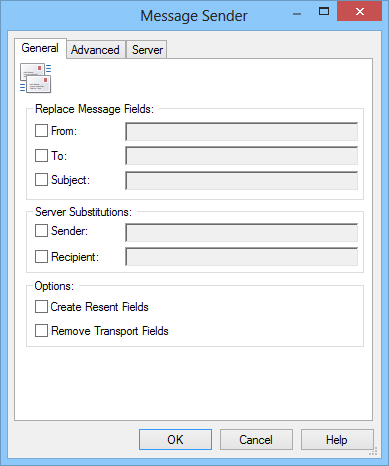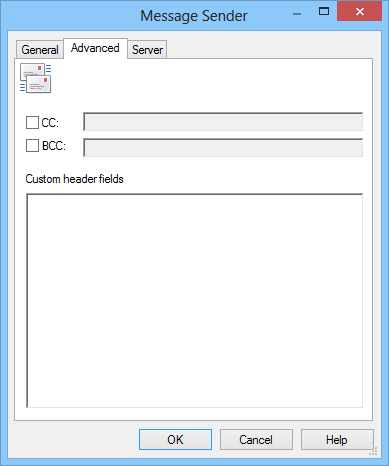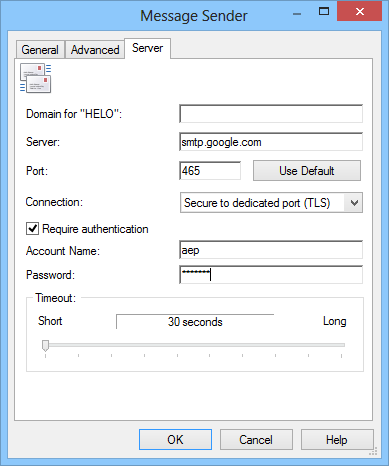Message Sender
Used for automatic resending of a received message through specified mail server.
This action differs from regular forwarding of a message. When forwarding a message, a new message is created, and the whole original message, including its body and heading, is copied into body of the new message. Resending leaves the original message body intact, only changing the fields in its heading. In this instance, recipient will actually receive the original message, but from another sender.
The Message Sender provides for complete processing of the original message heading, setting up connection with the relevant mail server, and sending the message to that server. Message is sent using the SMTP protocol, and the mail server should allow receiving for the sender's address and sending for the recipient's address. Otherwise, the server will deny sending the message.

Replace Message Fields
Replacement of the information in main fields of original message heading. Tick the relevant box and type new data in the text field to the right of it.
From
The "From" field in message heading - sender's address. If the field is empty, original message sender's address is used.
To
The "To" field in message heading - recipient's address. If the field is empty, original message recipient's address is used.
Subject
The "Subject" field in message heading - message subject. If the field is empty, original message subject is used.
Server Substitutions
Values substituted into the SMTP protocol properties for exchange with the specified mail server. To enable substitution, tick the relevant box and type the new value in the text field right of it.
Sender
Value of the "MAIL FROM" property - who the message is sent from. If the box is not ticked, the value from the From field is used.
Recipient
Value of the "RCPT TO" property - who the message is sent to. If the box is not ticked, the value from the To field is used.
Create Resent Fields
Check this box if you want the information about current resending to be added to the message. Then, the message sender will add the "Resent-*" fields to the message heading. These fields will contain the information on who and when resend the message.
Remove Transport Fields
These fields - "Received" and "X-*" - contain the information about original message delivery root. Check this box, if you don't want this information to be enclosed with the message you are resending.

CC
Carbon Copy to secondary recipients
BCC
Blind Carbon Copy to tertiary recipients who receive the message. The primary and secondary recipients cannot see the tertiary recipients.
Custom header fields
Processing of additional fields in the message heading. Type the field name and its value in the editing box, as you want them to appear in the message you are resending (e.g., "X-Mail-From: AEP"). If the message already contains such fields, they will be replaced with new values.

Domain for "HELO"
Name of the mail server's domain it communicates to other SMTP servers.
It is recommended that you enter your real domain name. If no domain name is entered, the program will try to detect it automatically. If detection fails for some reason, the domain name localhost will be used. Usage of the localhost alias or of another domain name is not prohibited; however, in this instance some servers with high security level would deny working with your mail server.
If you connect to the Internet via a proxy server using the Socks5 protocol, you must enter the proxy server domain name, because its automatic detection is impossible.
Server
Name of the mail server you're resending the message to.
Port
Port number on that server.
Connection
Combo box with following selection:
Regular
Typical SMTP protocol
Secure to regular port (STARTTLS)
STARTTLS is an extension to plain text communication protocols, which offers a way to upgrade a plain text connection to an encrypted (TLS) connection instead of using a separate port for encrypted communication.
Secure to dedicated port (TLS)
Encrypted communication for SMTP to the server using Transport Layer Security (TLS).
Use Default
Click this button to use default port number (Port 25).
Require authentication
Check this box, if user authorization is required by the mail server to send a message.
Account Name
User name used to access the mail server.
Password
Password used to access the mail server.
Timeouts
Set mail server connection timeout values. Move the slider to the desired position between Short and Long.
See also
